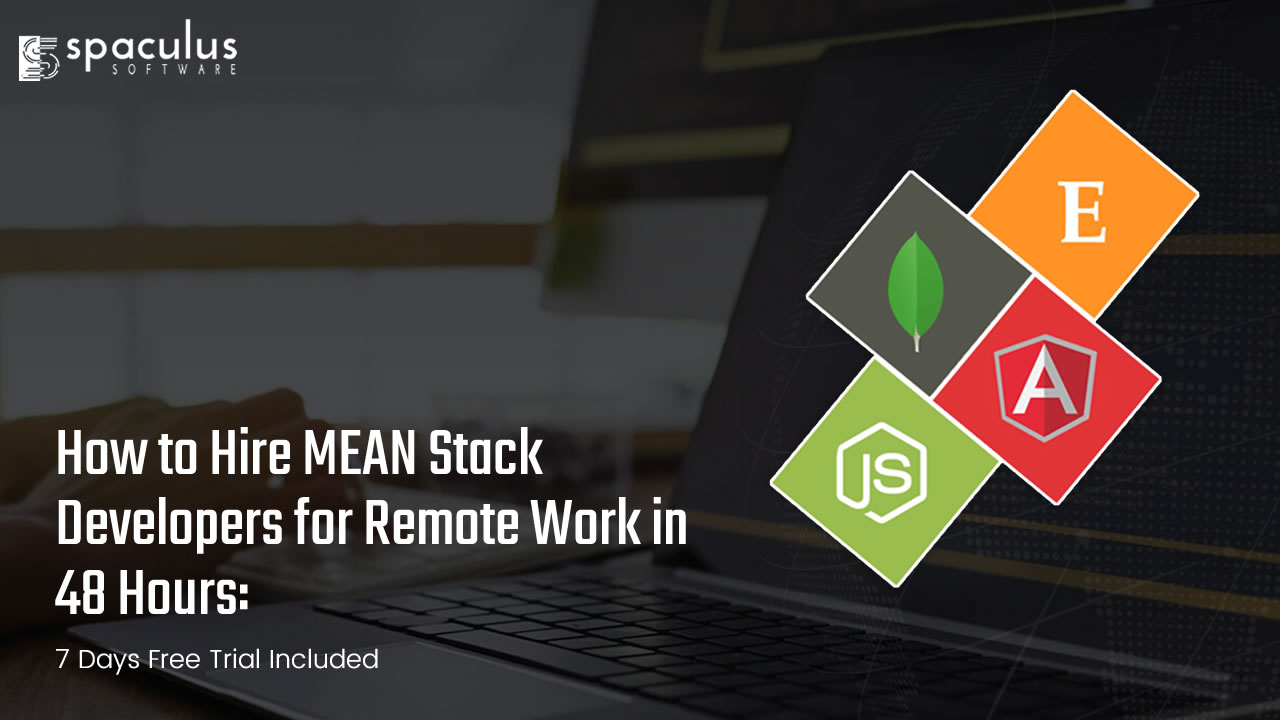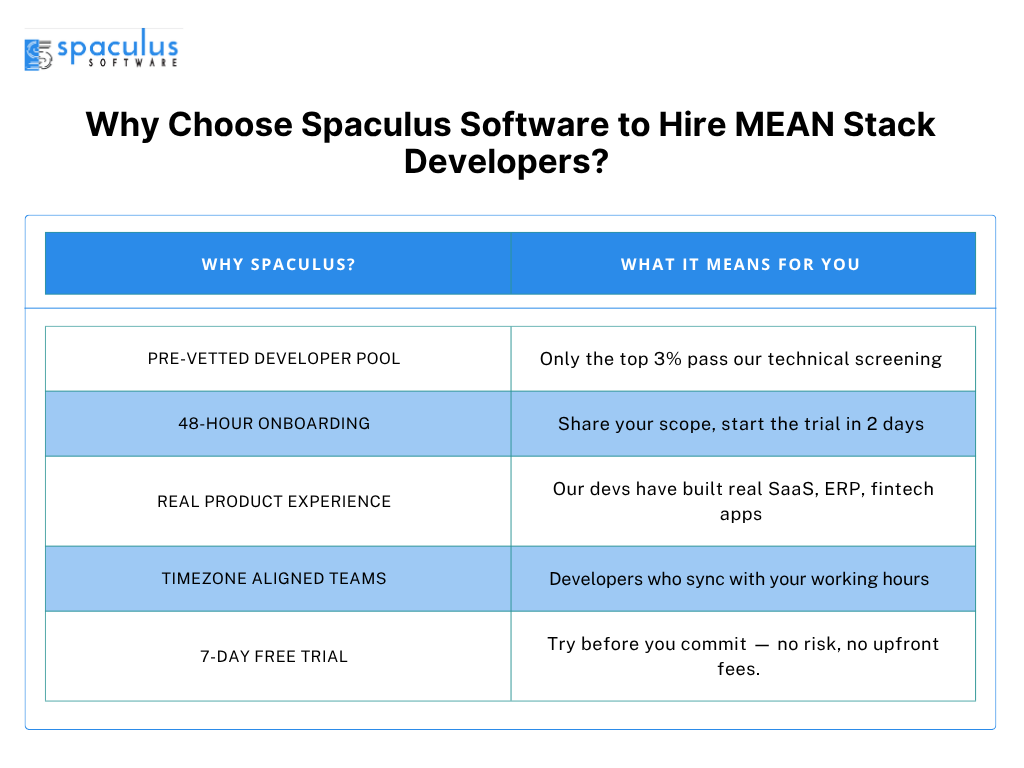
Building fast.
Hiring faster.
That’s the new standard.
Especially when deadlines are tight and features can’t wait.
But most companies get stuck.
They overthink hiring.
They waste time filtering resumes instead of shipping code.
If you need a MEAN stack developer — full-stack, JavaScript-first, and remote-ready — this guide shows how to get one onboarded in just 48 hours.
Even better: start with a 7-day free trial, risk-free.
Let’s break it down.
MEAN = MongoDB, Express, Angular, Node.js
That’s full-stack JavaScript.
Front to back.
Database to UI.
One language. One flow.
Here’s what they bring to your team:

| Skill Area | What MEAN Devs Do |
| Backend | Create secure APIs using Node.js & Express |
| Frontend | Build dynamic SPAs with Angular |
| Database | Manage flexible, fast MongoDB data models |
| DevOps Basics | Deploy and monitor full-stack apps efficiently |
| Agile Workflow | Ship features fast in lean environments |
Perfect for startups, SaaS, and scale-ups.
Remote dev teams need one thing above all:
Speed without chaos.
MEAN stack gives you:
And most importantly:
You can scale your remote product team faster.
| Scenario | Why MEAN Fits |
| MVP launch in 2–3 weeks | Rapid dev cycles with 1–2 devs max |
| Replacing old LAMP stack | Unified JavaScript means faster upgrades |
| Real-time features (chat, live updates) | Node.js handles async well |
| Budget constraints | 1 full-stack dev covers more ground |
| Agile sprints needing faster feedback loops | Angular + Mongo make iteration smoother |

You go to Upwork.
Or LinkedIn.
Or a job board.
Thousands of profiles.
Too many options.
No clarity.
Most aren’t available now.
Many overstate skills.
Some ghost after the interview.
You end up with:
You don’t need more resumes.
You need 1 great dev — now.
| Criteria | Average Dev | Top MEAN Stack Dev |
| Communication | Basic responses | Asks smart questions before building |
| Code Quality | Works… somehow | Modular, readable, scalable |
| Angular Mastery | Basic routing, forms | RxJS, State Management, Component Optimization |
| Node + Express | CRUD routes only | Middleware, error handling, RESTful principles |
| MongoDB | Just insert/find | Aggregations, indexing, Mongoose best practices |
| Ownership | Asks for specs only | Suggests better, faster ways to build |
| Remote Work Ethic | Misses standups, unclear status | Clear updates, async-friendly, no babysitting |
Simple.
Use a vetted talent network — not a job board.
Here’s how it works:
| Step | Action | What Happens |
| 1 | Share your project scope | A real human matches you with the right profiles |
| 2 | Get 1–3 curated MEAN devs in 12–24 hrs | Each already vetted for skills + remote readiness |
| 3 | Interview (optional) | Only takes 30 minutes or skip and start trial |
| 4 | Start 7-day free trial | No risk, full code ownership, cancel anytime |
No recruiters.
No fluff.
Just solid talent, ready to build.
Not just “see if you like them.”
This is full production mode.

| Trial Includes | Details |
| Full-time dev (40 hrs) | Treated like part of your in-house team |
| Real code, real features | Work on your actual sprint or feature build |
| Daily standups (optional) | Slack, Zoom, ClickUp — however your team runs |
| Repo + Task access | GitHub, Jira, Notion – all included |
| Full IP rights | You own every line of code created during trial. |
If you like the work, keep going.
If not, end the trial — no payment required.
You don’t need full specs.
But come prepared with this:
| Prep Item | Why It Helps |
| 3–5 user stories | Shows the actual features they’ll build |
| Tech stack list | Helps match devs with experience in exact tools |
| Timezone overlap req. | Keeps communication tight |
| Code repo access | So they can contribute from day one |
| Decision deadline | Avoids the “maybe later” trap — commit to trial or not |
Start with one.
Then scale.
Here’s a quick table on growing your MEAN stack dev team smartly:
| Team Size | Role Breakdown | When to Scale |
| 1 Dev | Full stack (Angular + Node + Mongo) | MVP or new feature idea |
| 2–3 Devs | 1 Frontend, 1 Backend, 1 DevOps/QA | Mid-stage startup or fast iteration phase |
| 4–6 Devs | Frontend Lead, Backend Lead, QA, DevOps | Scaling product + stability required |
| 7–10+ Devs | Add PM, Architect, SRE | Need CI/CD, observability, global user base |
US-based logistics startup hired 1 MEAN developer using Turing.
✅ 48-hour onboarding
✅ Started on real-time dashboard feature
✅ Deployed to production in week 2
✅ Saved $8,000/month vs hiring locally
Now running with a remote team of 4, fully async.
Code quality rated “A” in internal review.
You don’t just need a developer.
You need a dependable partner.
At Spaculus Software, we make hiring remote MEAN stack developers feel effortless — and effective.
Here’s why businesses across the globe trust us when they need to Hire MEAN Stack Developers who truly understand full-stack performance.
| Why Spaculus? | What It Means for You |
| Pre-vetted Developer Pool | Only the top 3% pass our technical screening |
| 48-Hour Onboarding | Share your scope, start the trial in 2 days |
| Real Product Experience | Our devs have built real SaaS, ERP, fintech apps |
| Timezone Aligned Teams | Developers who sync with your working hours |
| 7-Day Free Trial | Try before you commit — no risk, no upfront fees. |

You stay in control.
We handle the vetting, matching, and onboarding.
And if you’re not satisfied by day 7?
No cost. No lock-in.
You only pay when you’re happy.
Choose Spaculus Software — and hire smart from day one.
Hiring MEAN stack developers shouldn’t be hard.
It should be smart.
Skip the resume pile.
Go where vetted talent lives.
Start with one.
See the code.
Pay only if impressed.
Need a MEAN stack developer today?
Try a 7-day free trial with zero risk.
You’ll know in one sprint whether they’re the right fit — no guessing, no delays.
Hire mean stack Developers